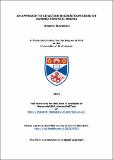Files in this item
An approach to situation recognition based on learned semantic models
Item metadata
| dc.contributor.advisor | Dobson, Simon | |
| dc.contributor.author | Stevenson, Graeme | |
| dc.coverage.spatial | 266 | en_US |
| dc.date.accessioned | 2015-04-23T14:27:36Z | |
| dc.date.available | 2015-04-23T14:27:36Z | |
| dc.date.issued | 2015-06-24 | |
| dc.identifier | uk.bl.ethos.644835 | |
| dc.identifier.uri | https://hdl.handle.net/10023/6555 | |
| dc.description.abstract | A key enabler of pervasive computing is the ability to drive service delivery through the analysis of situations: Semantically meaningful classifications of system state, identified through analysing the readings from sensors attached to the everyday objects that people interact with. Situation recognition is a mature area of research, with techniques primarily falling into two categories. Knowledge-based techniques use inference rules crafted by experts; however often they compensate poorly for sensing peculiarities. Learning-based approaches excel at extracting patterns from noisy training data, however their lack of transparency can make it difficult to diagnose errors. In this thesis we propose a novel hybrid approach to situation recognition that combines both techniques. This offers improvements over each used individually, through not sacrificing the intelligibility of the decision processes that the use of machine learning alone often implies, and through providing better recognition accuracy through robustness to noise typically unattainable when developers use knowledge-based techniques in isolation. We present an ontology model and reasoning framework that supports the uniform modelling of pervasive environments, and infers additional knowledge from that which is specified, in a principled way. We use this as a basis from which to learn situation recognition models that exhibit comparable performance with more complex machine learning techniques, while retaining intelligibility. Finally, we extend the approach to construct ensemble classifiers with either improved recognition accuracy, intelligibility or both. To validate our approach, we apply the techniques to real-world data sets collected in smart-office and smart-home environments. We analyse the situation recognition performance and intelligibility of the decision processes, and compare the results to standard machine learning techniques and results published in the literature. | en_US |
| dc.language.iso | en | en_US |
| dc.publisher | University of St Andrews | |
| dc.subject | Situation recognition | en_US |
| dc.subject | Smart spaces | en_US |
| dc.subject.lcc | TK7871.676S8 | |
| dc.subject.lcsh | Intelligent sensors | en_US |
| dc.subject.lcsh | Situational awareness | en_US |
| dc.subject.lcsh | Expert systems (Computer science) | en_US |
| dc.subject.lcsh | Machine learning | en_US |
| dc.subject.lcsh | Semantic computing | en_US |
| dc.title | An approach to situation recognition based on learned semantic models | en_US |
| dc.type | Thesis | en_US |
| dc.type.qualificationlevel | Doctoral | en_US |
| dc.type.qualificationname | PhD Doctor of Philosophy | en_US |
| dc.publisher.institution | The University of St Andrews | en_US |
This item appears in the following Collection(s)
Items in the St Andrews Research Repository are protected by copyright, with all rights reserved, unless otherwise indicated.

